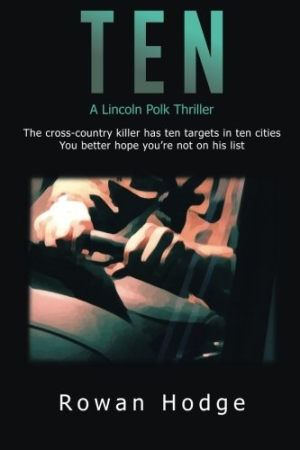Ten
A Lincoln Polk Thriller
Reality TV turns too real in this expert mystery thriller.
Most viewers of reality TV know that the shows are somewhat scripted. What if instead, the reality in the world off the set began to mirror a reality-TV program? That’s the premise of Rowan Hodge’s exciting, tightly plotted murder-mystery thriller, Ten.
As FBI Special Agent Lincoln Polk tries to heal from the physical and psychic wounds inflicted by his most recent case, a new whodunit reality show premieres. A murder takes place in each of the ten self-contained episodes, each of which is set in a different city and uses a different cast. Viewers are invited to contact the show’s producers to vote on the culprit’s identity. Correct guessers receive some of the prize money. As the episodes air, police in each city find a murder victim killed in a similar fashion to the person who perished in the show. In between gruesome deaths, razor-sharp dialogue, and races against the clock, Ten explores themes of healing, redemption, depravity, and the effects media can have on the world.
Lincoln, his partner, his psychiatrist, and the murderer all possess well-rounded personalities, allowing understanding and empathy. Suffering a mental crisis after his last takedown gives Lincoln a compelling past, and the knowing way he and he partner reminisce about the “sick fucks” from past cases and the way Lincoln’s partner teases him by pronouncing Lincoln’s last name as “Poke” clearly demonstrate how easily the author creates natural-sounding dialogue.
Hodge masterfully drums up a little sympathy for the cold-blooded assassin as readers learn what drove this person to commit the crimes. Indeed, even the murder victims and the police officers assisting with the case also emerge as three-dimensional. Although the narrative is lengthy, it doesn’t feel long; realistic dialogue, descriptive similes, and nonstop action keep readers engrossed. Moreover, Hodge’s innovative use of additional devices beyond standard narrative convention—including therapist’s notes, newspaper articles about the show, and transcripts of telephone conversations—serve as reminders of the narrative’s scope while maintaining intrigue.
For all of its stellar storytelling and character development, the book’s frequent textual errors and questionable word choices for some characters are very distracting. Punctuation is often missing or inconsistently used. The book would have been well served by a final proofreading before going to print.
In the text, the speech of many characters (e.g., African American, Irish, or New York Jewish) are written phonetically, making what these characters say hard to read. Also, the book uses too many different fonts, to the point of annoyance.
After a thorough proofing, this book could be enjoyed by anyone who likes expert thrillers or titillating mysteries.
Reviewed by
Jill Allen
Disclosure: This article is not an endorsement, but a review. The publisher of this book provided free copies of the book and paid a small fee to have their book reviewed by a professional reviewer. Foreword Reviews and Clarion Reviews make no guarantee that the publisher will receive a positive review. Foreword Magazine, Inc. is disclosing this in accordance with the Federal Trade Commission’s 16 CFR, Part 255.

